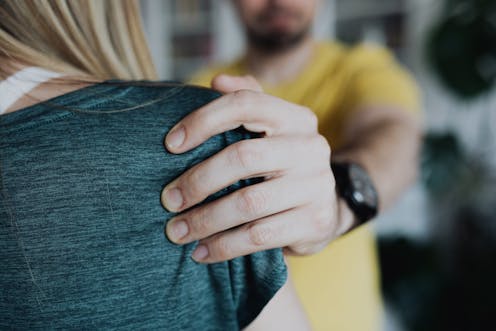Source: The Conversation (Au and NZ) – By Kirsty Forsdike, Senior Lecturer, La Trobe Business School and Senior Researcher in Centre for Sport & Social Impact, La Trobe University

Karolina Grabowska/Pexels, CC BY-SA
Not everyone looks forward to the Melbourne Cup. Domestic violence and emergency services ready themselves for a potential increase in calls, call-outs and admissions.
But as our recent review shows, the Melbourne Cup isn’t the only major sporting event around the world linked to a rise in domestic violence.
Not everyone agrees on why this is happening. We show alcohol is just one factor.
Read more:
Is the Melbourne Cup still the race that stops the nation – or are we saying #nuptothecup?
What’s going on?
Police-recorded assaults and emergency department presentations for assault increase on or around the major sporting events in Victoria – the AFL grand final, Melbourne Cup and Formula 1.
In particular, domestic violence assaults rise significantly on the day of the Melbourne Cup.
In New South Wales, police data across six years shows domestic violence assaults increased by more than 40% following State of Origin rugby league games compared with non-State of Origin nights.
Our review also shows domestic violence increases on days of, and around, major sporting events around the world. This includes major National Football League games in the United States and Canada, and soccer matches in Scotland.
Read more:
Whether teams win or lose, sporting events lead to spikes in violence against women and children
Why is this happening?
Not everyone agrees on why domestic violence is linked with major sporting events. We know perpetrators are more likely to use violence or become more violent during public holidays in Australia. Both the AFL grand final and the Melbourne Cup receive a dedicated public holiday in Victoria on or around the event.
Alcohol is certainly a risk factor for increased frequency and severity of domestic violence. The use of alcohol during major sports events and over holidays is well documented.
Similarly, gambling and stress over income loss is also linked to the increased use and escalation of domestic violence. These too can occur around the time of events, such as the Melbourne Cup.
But focusing on alcohol and gambling alone runs the risk of such violence being excused. This focus can send the message that men cannot be held entirely responsible for their behaviour.
A sport’s culture
A sport’s culture can also be a contributing factor to domestic violence. Sport, violence, and what it means to be a man have long been recognised as connected. For instance, coaches promote aggression for performance.
There’s also an emotive connection to sport. Sport fans display “irrational passions”, maintain “blind optimism”, have “highly charged” memories and passion that mimic “addiction”.
Read more:
Toughen up snowflake! Sports coaches can be emotionally abusive – here’s how to recognise it
However, our review also showed that not all sports or their events are associated with domestic violence. Each sits within a culture that differs from sport to sport and country to country.
Some studies we reviewed showed that contact sports, such as American football, were associated with increases in domestic violence. Meanwhile, other contact sports, for instance, rugby union in the United Kingdom, were not.
Soccer is a non-contact sport but was linked to increased rates of domestic violence in the UK. Traditional rivalry between opposing soccer teams had a significant impact on domestic violence rates.
Perhaps emotionally charged games may best indicate whether an increased rate in domestic violence is likely. Examples include finals, or when a team is close to winning or losing a league. Frustrating or controversial outcomes, such as poor play or refereeing decisions, may also predict a rise in domestic violence.

Pixabay, CC BY-SA
An unexpected loss, for example, is connected with increased domestic violence rates, more so if that game is also considered important, for example during finals or potentially exiting a World Cup.
However, a UK study found that alcohol-related domestic violence significantly increased only when England won, not when they lost or drew. So losing is not necessarily the key factor.
Drinking motives may come into play here, with different supporters drinking (more) to celebrate or to cope.
When taken together, we can conclude it’s the culture of a particular sport in a particular country, exaggerated by keen rivalry, how emotionally charged a game might be, and when the game is played, that can predict a rise in domestic violence. That’s in addition to increased gambling or alcohol use linked to these events.
Read more:
How sport can tackle violence against women and girls
What can we do about it?
Policies to address domestic violence associated with sport need to be tailored to the places where an event is taking place and how a country’s, or even state’s, culture influences sporting fans’ behaviour.
We need to think about:
-
when major sporting events are scheduled (ideally away from public holidays)
-
limiting alcohol availability and increased prices, particularly during major events
-
joint planning across police, health and specialist domestic violence services ahead of major sporting events
-
developing social marketing campaigns for fans to coincide with
with sporting events, such as the AFL grand final’s #liftyourgame. Such campaigns need to be free of alcohol and gambling sponsorship.
Initiatives need to be developed with support from policy makers, state, and national sports organisations, as well as specialist domestic violence and emergency services.
They need to be effectively tailored to the sport, its fans, and the cultural context being targeted. They need to happen now and be evaluated.
If this article raises issues for you or someone you know, contact: 1800 RESPECT (1800 737 732), Safe Steps (1800 015 188), Men’s Referral Service (1300 766 491) or Mensline (1300 78 99 78). In an emergency, call 000.
William Douglas, policy and projects officer at No to Violence co-authored this article and is a partner in the research mentioned in it.
![]()
Kirsty Forsdike currently receives funding from the Department of Jobs, Precincts and Regions of the Victorian Government to research the prevention of violence against women through sport and has previously received funding from the Office for Women in Sport and Recreation to explore violence against women in sport. She also receives funding from the Victorian State Government Crime Prevention Innovation Fund and has previously received funding from the Department of Social Services, Department of Premier and Cabinet, Respect Victoria and Department of Social Services.
Anne-Marie Laslett receives funding from the
Australian Research Council and
*veski
*The Victorian Near-miss Award Pilot is being administered by veski for the Victorian Health and Medical Research Workforce Project on behalf of the Victorian Government and the Association of Australian Medical Research Institutes. Funding for the Pilot has been provided by the Victorian Department of Jobs, Precincts and Regions. The Victorian Near-miss Awards are provided to eligible individuals who narrowly missed out on the 2021 NHMRC Investigator Grant funding in the Emerging Leaders 2 stream.
Associate Professor Leesa Hooker currently receives funding from a Victorian Department of Jobs, Precincts and Regions Crime Prevention grant. She does not work for, consult, own shares in or receive funding from any company or organisation that would benefit from this article, and has disclosed no other relevant affiliations beyond her academic appointment.
– ref. This Melbourne Cup, alcohol and sport collide. We need to watch out for domestic violence – https://theconversation.com/this-melbourne-cup-alcohol-and-sport-collide-we-need-to-watch-out-for-domestic-violence-191497




